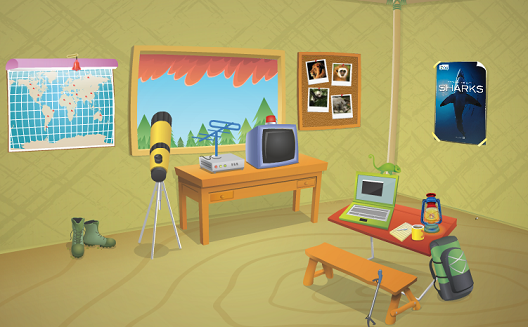Would your kids play in an online world? Dubai design agency RBBi launches Worldoo


“Nobody talks about what happens after the first click,” says Amol Kadam, cofounder of UX/UI design agency RBBi (Red Blue Blur ideas) in Dubai. “People are so focused on social media and advertising that they often ignore user experience.”
After moving to Dubai in 2005 to join media design company Fortune Promoseven, Kadam met his cofounder Devesh Mistry and decided to launch RBBi in June 2011, to fill a gap he saw in the market for good usability and user experience design.
By focusing in on case studies of each taregt market and using two Tobii Eye Trackers to test users' preferences and create a heatmap of the fonts, sizes, and colors that they look at the most, RBBi was able to secure clients that include the Marriott, Givenchy, The Ritz-Carlton, World Wildlife Fund, and Sky News Arabia.
Now, the design agency is expanding from traditional brands to children’s content, a growing trend in the Arab world. RBBi has built an an interactive online community for “pre-Facebook” age children from 7-14 years old, called Worldoo, based off of a concept submitted by one of their clients. In September, they plan to unveil it in the Arab market.
An online world for children
Worldoo began as the vision of India-based media company Focus
Kids, which wanted to build an online community where children
could consume media outside of television.
After RBBi won the bid, beating out three other teams from around
the world, their team of 15 spent six months researching what both
children and parents would want to see in an online platform.
The most important conclusion they came away with is
that parents don’t like banner ads, simply
because they don't know where the ads lead their children online.
Despite the potential for ad revenue, RBBi convinced Focus Kids to
avoid banners and keep the interface simple. (The case study
from their research is available here).
Next, they built an online world that offers educational videos, games, characters, customizable homes, in-game currency, branding, and social functions, all focused around self-expression.
“We understood that self-expression is key. At this age, kids
want to express themselves but sometimes they don’t have the right
outlet, so we give that to them,” says Kadam. Following
international COPA laws, users signup by creating a username and
password and entering a parent’s e-mail address, who then must
approve their activation.
True to its vision, Worldoo is very interactive. It offers
Foursquare-style check-ins so that kids can become the “boss” of a
specific island by spending the most time there; it also offers
them the ability to chat with friends or visit a friend’s house.
And to ensure that no one is left out, each player begins with five
computer friends who offer in-game news, warn a player if they
can’t make certain actions in the game, and alert tham to new
social events.
Perhaps most importantly, the platform will be moderated to ensure
that all interaction remains safe for children.

Will kids like it? Will brands?
Parents might wonder, will kids really take to an online world,
instead of hanging out and playing games in person? Thus far,
children globally are jumping to participate in online communties.
Similar platforms like Club Penguin have been a
huge hit internationally, offering a space for young users to make
friends and win rewards. RBBi seems to be hitting all the marks
that make these platforms successful; it's fun, secure, social, and
educational.
Since April, Worldoo's Indian platform has seen over 5,000 signups.
Sponsored content is also a large part of the experience- and
revenue stream. The Cartoon Network, Warner Bros, National
Geographic, and ZeeQ have all joined as sponsored, offering
original in-game content. For instance, users can travel around the
Worldoo map and click on an island sponsored by National Geographic
and choose to watch a video about endangered species to earn more
stars (the in-game currency).
Educational content rewards users with more stars than simple games
as a way to “incentivize learning,” says Kadam.
Brands can also reach users by creating their own themes and decorations for a player’s house. “If a kid goes into his house, he can find a bowl of popular cereal in the kitchen for example,” says Kadam. Prime real estate must be maintained with a steady stream of fresh content, however.
Scaling
Before handing the project back over to Focus Kids, RBBi created a manifesto with recommendations for future game play as well as suggestions for brands to cultivate or avoid, based upon their research into parental preferences.
“Our goal is twofold: to continue user testing to find out what’s working and what’s not, and, in phase two, to go to tablets and mobile,” says Kadam. In the future, RBBi will help build a Worldoo app for Android, so that kids can keep track of all of their notifications, chats, and their online houses via smartphone.
Soon, they will also release a public API so that brands can create their own in-game content; this will be the first step towards localizing the game for the Arab world. And with the rise of educational kids content online and on mobile devices in the region, it will be interesting to see if the Arab market is ready for such a platform.
What do you think? Are platforms like Worldoo a good way for brands to reach children in the Arab world? Will parents be comfortable with their young children socializing online?


